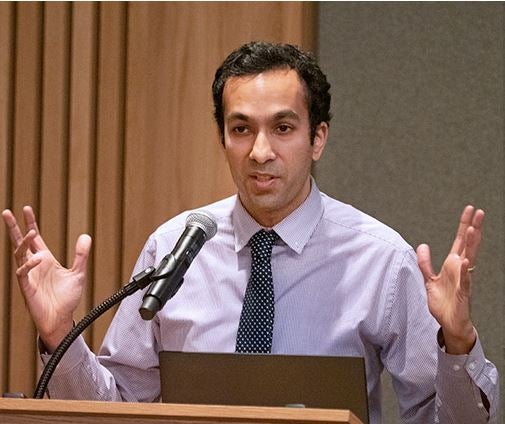Penn Hosts Fourth Annual Meeting of the Population Health Science Workshop

From LDI:
Academic scientists from Penn and two dozen other universities including Harvard, Yale, Princeton and Brown attended the Fourth Annual Population Health Science Research Workshop, December 5-6, 2019 at the University of Pennsylvania. Topics discussed were the broad decline in health across the U.S.; links between social isolation and health; sleep and health in low-income communities; gender disparities among health care professionals and their impact on patients; deploying genetics in population health research; hospital consolidation’s impact on community costs and care; and other areas of inquiry including how the stress of Donald Trump’s presidential campaign may have physically affected the health of pregnant Latina women and their babies.
The Population Health Science Workshop was organized four years ago by research colleagues Atheendar Venkataramani, MD, PhD, of Penn; Jacob Bor, ScD, SM, of Boston University; and Willa Friedman, PhD, of University of Houston. All are Assistant Professors at their respective schools. Venkataramani’s research focuses on life-course origins of health and socioeconomic inequality; Bor’s focuses on the study of population health, especially on HIV treatment and prevention in southern Africa; and Friedman’s focuses on health, education, political economy and behavioral economics.
“When we began this, the three of us could see the increasing national focus on matters of population health, but we couldn’t see a clear definition of what that term actually meant.” said Venkataramani, a CHIBE affiliated faculty member, a faculty member at the Penn Department of Medical Ethics and Health Policy and an LDI Senior Fellow.
‘Coalescing thread’
“Provider organizations have their own ideas, which involve caring for a large group of people and optimizing certain activities like medical screening,” Venkataramani said. “But then on the economics and epidemiology side, there is a sense that social factors and policy could shape the health of large populations. And other fields, like demography and sociology, are working hard to describe trends in health outcomes for different groups of people. Across these fields, we saw scholars interested in reaching across disciplinary boundaries to generate new insights. However, there was no interdisciplinary space for these people — many of whom are young researchers — to meet and build novel collaborations. That’s what the Workshop idea was all about — to build a coalescing thread across disciplines that defines the cutting edge of population health science.”
“A goal of the Workshop is to redefine the science, especially because we are realizing that health systems are probably not the biggest determinant of population health anymore,” continued Venkataramani. “The larger context of this is that the U.S. has fallen off the trend of other industrialized countries in mortality and life expectancy since about 1980 and we have even reversed some of the health gains achieved over the last century.”